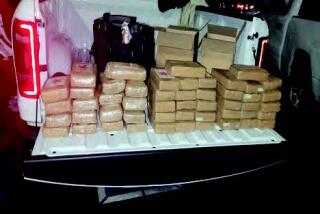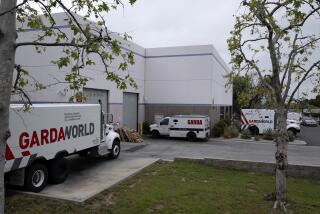Orange County Firm’s Fraud Tied to BCCI
- Share via
Federal prosecutors in Los Angeles said Wednesday that a massive, fraudulent Orange County telemarketing operation funneled $3 million into a Panamanian subsidiary of Bank of Credit and Commerce International.
It is apparently the first known disclosure linking a Southern California white-collar criminal enterprise to BCCI, the Luxembourg-based banking group that is at the center of an international banking scandal.
First American Currency in Laguna Hills cheated investors out of $16 million as part of a precious-metals investment company that operated from 1983 to 1985, according to federal investigators. First American is said to have transferred the $3 million into BCCI Panama through a brokerage there known as Allen W. Lloyd y Associados, said Assistant U.S. Atty. Steven M. Bauer.
Lloyd was in existence for only a brief time, Bauer said. The $3 million was sent to two BCCI accounts, one in the name of Panama International Trust Corp. and another in the name of Rebeca Industries.
Investigators determined that $650,000 was then returned to the United States and deposited in a Southland escrow company, which was used by First American co-owner Gilbert Traylor Jr., 48, to purchase an oceanfront Carlsbad home costing the same amount, Bauer said.
It is not known what happened to the other funds that were transferred to BCCI, according to Bauer. “The remaining $2.35 million we’ve been unable to track any further,” he said.
On Wednesday, Traylor, of Dana Point, surprised prosecutors by pleading guilty to eight counts of mail fraud and two counts of tax evasion. A former vice president of First American, Riverside resident Lester Thompson, 47, pleaded guilty to four counts of mail fraud.
The transfers to BCCI were signed by Traylor and First American co-owner Eric Kuvet, Bauer said. Kuvet, formerly of El Toro, is a fugitive, prosecutors said.
Bauer said Traylor and Kuvet arranged the BCCI transfers through an accountant who used the alias Luis Cordero. Prosecutors have identified Cordero as William Carl, under indictment in the First American case. Carl is said to have numerous banking contacts in Panama.
Carl, once a Mission Viejo resident, “told people the reason he used Luis Cordero was because there are so many people in Mexico with that name that nothing could ever be traced to him,” Bauer said. Carl is a fugitive, he said.
Those familiar with BCCI’s connections to Southern California said several suspected drug kingpins had laundered money through the institution, but they were unaware of any Southern California white-collar criminals sending deposits there.
BCCI, dubbed the Bank of Crooks and Criminals International in some circles, was seized by regulators in seven countries, including the United States, earlier this month. Officials suspect it of a wide range of criminal activity. The bank was reportedly used by Manuel A. Noriega, Saddam Hussein, Ferdinand Marcos and South American drug cartels.
The BCCI branch in Panama reportedly helped Noriega loot his country’s treasury.
Banking authorities claim BCCI had a secret controlling interest in Independence Bank in Encino. The Federal Reserve Board earlier this year ordered BCCI to sever any and all connections with Independence.
The Bank of England, Britain’s chief banking regulator, once welcomed BCCI to its country with open arms but is now deflecting an avalanche of criticism because many depositors there--including local governments and small businesses--are expected to lose the vast majority of the $1.1 billion they deposited in the bank.
First American Currency officials were indicted in early February on charges that they sold over the telephone illegal futures contracts for precious metals. Prospective customers were told that their money would be used to purchase metals or related contracts “when, in fact, most of the investors’ money was diverted to the personal benefit of the defendants,” according to prosecutors.
Bauer said last February in an interview that Traylor had a Rolls-Royce and the three other defendants each drove Corvettes.
“This is one of the largest boiler rooms that’s been indicted in California,” Bauer said at the time.
Federal authorities said First American’s salespeople were given written instructions describing how to persuade reluctant customers to part with their money.
If a customer, for example, said he wanted to pray before making a decision, then a First American telephone salesperson was instructed to say: “Do you feel that I would be on the phone with you if the Lord felt that this was something you shouldn’t do?”
More to Read
Sign up for Essential California
The most important California stories and recommendations in your inbox every morning.
You may occasionally receive promotional content from the Los Angeles Times.













